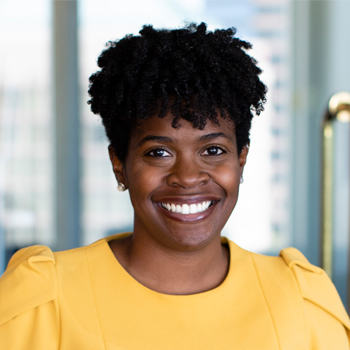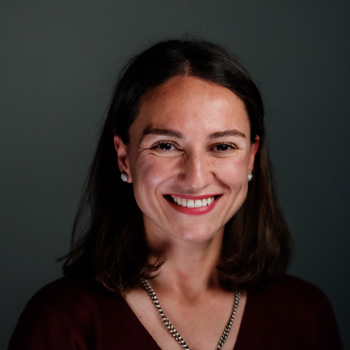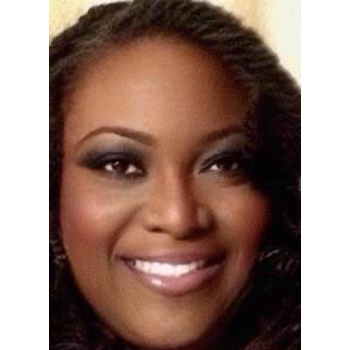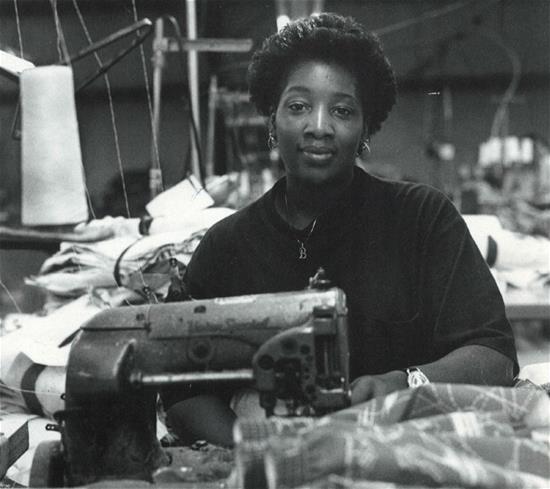Leadership Profiles
Socially Responsible Investing

Ebony Perkins, Investor and Community Relations Manager
Ebony Perkins is a dedicated, solution-oriented social entrepreneur whose heartbeat is community. She has a demonstrated ability of working with investors and philanthropists to help them make smart and strategic decisions. As Self-Help's Investor & Community Relations Manager, Ebony helps groups and individuals invest funds in a socially responsible financial institution that supports communities of all kinds, especially those underserved by conventional lenders. Before that role, she served as the Donor Relations Manager at Central Carolina Community Foundation where she managed a system to engage and educate over 400 individuals and groups to help them achieve their charitable goals.
Ebony’s commitment to community investing is evident by her service and contributions to Women In Philanthropy, Durham Center for Senior Life, and the University of North Carolina MPA Alumni Board. Ebony was also recognized on the SRI Conference's inaugural 30 Under 30 List.
Ebony holds a Master of Public Administration from the University of North Carolina at Chapel Hill and a Bachelor of Science in Marketing from Claflin University as a summa cum laude graduate. She also has an Executive Certificate in Financial Planning from Duke University.

Nuray Ozbay, Policy and Impact Investment Associate
Nuray Ozbay leads Self Help’s efforts to cultivate mission-supportive depositors and impact investors within and beyond Self-Help’s California footprint. As a global movement and relationship builder, Nuray loves working with change-makers across non-profit, corporate, and public sectors. Her expertise is in intersectional gender equality, global civil society activism, social justice, and ESG investing. Nuray currently serves as a Board Director at the UN Women San Francisco Chapter and a National Expert on Violence Against Women at the European Women’s Lobby, the largest umbrella organization of women’s associations across Europe. Before joining Self-Help, Nuray spent 11 years in the social impact sector as a researcher, consultant, and non-profit leader across Turkey and Europe, working on issues including but not limited to immigration, women’s access to economy, financial literacy & inclusion, entrepreneurship, and care economy.

Kimberly Jones, Investment Associate
Kimberly's professional career spans both the nonprofit and community development financial services sectors, with expansive senior leadership roles in arts management; business and resource development; community relations; and corporate philanthropy. Currently, she's Self-Help's Investor Relations Manager, where she helps individuals and institutions align their banking and investments with their mission, vision, and values. Kimberly has held leadership positions that advanced the missions of creative organizations and community development financial institutions seeking to make a difference in communities in their footprint. She has been a founding board member of mission driven organizations that supported the growth and development of young artists, creatives, and professionals in the nonprofit sector.
In 2015, Kimberly was selected to be a PLACES Fellow with The Funders Network, where she explored the role of philanthropy through an equity lens in low to moderate income communities. She has served as a grant/award reviewer for organizations that championed organizational excellence, community development, and environmental sustainability. Kimberly has a BA in Political Science from the University of Minnesota-Morris and an MA in Arts, Entertainment, and Media Management from Columbia College Chicago.
Green Economy; Sustainable Society; Investing for the Environment
Melissa Malkin-Weber, Sustainability Director
Melissa has worked across a broad span of hands-on sustainability practices. At Self-Help Credit Union, she integrates the triple bottom line into the organization’s financial products, operations, and buildings portfolio. She led Self-Help to realize over $1.7 million in net present value from initiatives in this sector, including $180,000 energy savings in our own operations. Melissa previously directed the residential energy efficiency and indoor air quality research program at Advanced Energy and worked in industrial pollution prevention at RTI International. She earned her law degree from University of Michigan, and her Master's from UNC’s School of Public Health.
Shondra Tanner, Mortgage Lending
Shondra Owens Tanner brings her extensive experience and commitment to making mortgage loans for low-wealth families to her position as Self-Help's Director of Mortgage Originations, where she oversees all North Carolina home loan origination and new business development. Shondra's areas of expertise includes buying your first home, mortgage basics (documentation, closing costs, down payments), delinquency and loss mitigation (What is a forbearance and loan modification and what does that do to your credit?)
What’s a Co-op? Cooperative Ownership Can Mean Big Possibilities for Workers and Communities

The worker-owners of New Bern Bakery, Self-Help’s first backers, outside their storefront in 1981.
Did you know that as a credit union, Self-Help is one of many thousands of cooperative enterprises? There are currently over sixty-four thousand cooperatively owned and operated businesses in the U.S. working to meet a wide range of consumer and community needs, including financial institutions, restaurants and retail stores, manufacturers, and even utilities.
What makes these businesses different from traditional sole-proprietor businesses is that they are owned jointly by either their workers, their consumers, their communities – or any combination of the above. Joint ownership plus democratic structure means that cooperatives can make different choices than other businesses, often with big impacts on the communities they serve.
What is a co-op?
While cooperative businesses can take many forms, in general, a co-op is an enterprise that is owned and governed by its employees, consumers, or communities. As a group of co-owners, the members of a co-op share decision-making power in a one-member, one-vote system.
In worker-owned co-ops, workers jointly own and operate a business and share its profits. This could be a small retail business, like Durham, North Carolina’s Electric Violin Shop (check out their story here), or a multi-billion dollar, multi-sector enterprise with over 80,000 employee-owners, like the Mondragon Corporation in northeastern Spain, which was an early source of inspiration for Self-Help.
Consumers and communities can also work together to create cooperative businesses that meet a variety of needs, like grocery stores, schools, utilities, or housing. The Hendersonville Community Co-op in Hendersonville, NC, for example, has worked since 1978 to meet the Hendersonville community’s need for fresh, high-quality produce and natural foods, and in 2016, they partnered with Self-Help to finance their expansion.
How can co-ops benefit workers?
Worker-owned co-ops bring workers together for control and decision-making in the operations of the business. While traditional business structures rely on the leadership of a sole owner or corporate board of directors, worker-owned co-ops allow workers to make decisions for the business collectively and democratically.
This type of co-op also share profit and risk among worker-owners. When the business thrives, the employees share the fruits of their labor equally. When it falls on hard times, instead of laying off employees, worker-owned co-ops will often work together to make sure every employee is taken care of. This democratic structure can provide security and stability for worker-owners.
How can co-ops benefit communities?
Because co-ops aim to meet a collective need – whether for workers, consumers, or communities – they have the potential to provide stability and can strengthen local economies by keeping money in the community. While not every co-op business is guaranteed to be successful, a strong community co-op can prioritize the community’s needs over short-term profits.
Examples of cooperative businesses include:
-
Financial co-ops like credit unions are a major resource for communities, especially under-resourced and under-banked ones that have been historically shut out of traditional financial institutions.
- Food co-ops operated by and for the communities they serve can foster healthy food systems in areas where chain grocers might avoid opening supermarkets.
- Worker-owned cooperatives also provide an opportunity for retiring business owners to preserve the legacy of their work and maintain their employees’ jobs by giving employees what’s known as the “right of first refusal,” where the retiring employer gives workers the opportunity to jointly purchase the business and continue operating it cooperatively.
- While not businesses, land trusts and housing cooperatives are another type of co-op that can provide affordable and democratically controlled housing, especially in areas where gentrification threatens to price out longstanding communities.

Barbara Bardlavens, a worker-owner of the Workers’ Owned Sewing Company (WOSCO).
Self-Help’s legacy of strong partnerships with co-ops
Co-ops have been our partners since the very beginning. While our mission has always been creating and protecting ownership and economic opportunity for all, one of the first ways we worked to carry out this mission was by providing technical and financial assistance to new cooperative businesses started by displaced textile workers in North Carolina. Our very first equity came from a bake sale by a worker-owned bakery in New Bern, NC. You can read more about this work here.
Self-Help has partnered of the North Carolina Employee Ownership Center, a statewide nonprofit that educates business owners and their advisors on the benefits of employee ownership. You can learn more about their successes here.
Finally, as a credit union, our member-owner structure means that we’re part of a global movement of cooperative financial institutions that prioritize the financial goals of our member-owners. When you invest in credit unions, your money and your fellow member-owners’ money goes to work to strengthen communities, build wealth, and increase economic justice right where you live and work. You can learn more about credit unions as co-ops from the Filene Research Institute.
What resources are available to someone thinking about starting a co-op business?
If you’re thinking about how you might get started forming a cooperative yourself, there’s a wealth of resources from statewide and national organizations dedicated to educating the public about cooperative enterprise: